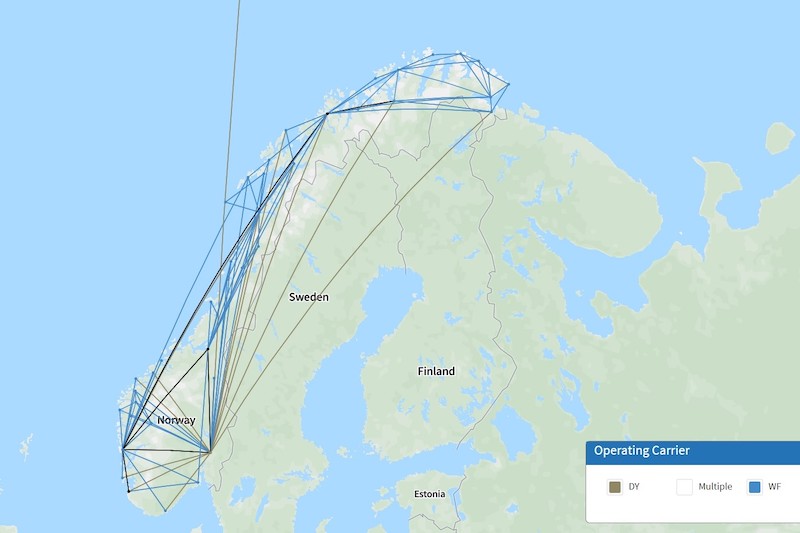
From left to right, Norwegian Air CEO Geir Karlsen, Wideroe CEO Stein Nilsen and Chairman of Norwegian Air Svein Harald Oeygard at a press conference covering Wideroe's acquisition by Norwegian at their headquarters in Fornebu, Norway, on July 6.
Norwegian CEO Geir Karlsen has described the airline’s planned acquisition of regional carrier Widerøe as a “milestone in Norwegian aviation history.”
The NOK1.125 billion ($105 million) deal for Widerøe’s owner WF Holding, subject to approval by the Norwegian Competition Authority, comes after the two carriers signed a letter of intent in July last year to cooperate in Norway’s domestic market and onward international flights.
The proposed move will create a larger challenger for rival SAS Scandinavian Airlines, expanding Norwegian’s offering into regional Norway, increasing the traditionally leisure-focused carrier’s market share in the business segment and dampening the seasonality of its operations.
For Widerøe, CEO Stein Nilsen says the deal “is in the best interest” for the carrier, given the higher level of tax for air travel in Norway, combined with fierce international competition—which makes it “difficult for a smaller regional to persevere without a strong partner.”
Data provided by OAG Schedules Analyser shows that SAS is the largest operator in Norway’s domestic market, with a 36.3% seat capacity share during July 2023. Norwegian is second at 33.5%, and Widerøe is third at 29%. Two other smaller operators—DAT and Lufttransport—make up the remaining 1.2%.
Norwegian’s domestic network spans 19 routes using 737-800s in July 2023, most of which touch Oslo Gardermoen Airport, as well as to hubs used by Widerøe, such as Bergen, Trondheim, Bodø and Tromsø.
Widerøe offers 88 domestic routes this month, connecting many smaller northern and fjord communities like Batsfjord, Forde, Hammerfest and Sandane that would otherwise be without scheduled air service. Many routes are via public service obligation (PSO) agreements with the Norwegian government.
Analysis of the airlines’ respective domestic networks shows that there is little overlap, with the two competing on just six of the combined 107 routes. Four are from Bergen—to Oslo, Stavanger, Trondheim and Tromsø—while both operate Oslo-Trondheim and Alta-Tromsø. Overall, Widerøe is the sole operator on 78 of the 88 domestic routes it serves.
“Our two airlines have operated side by side for many years, and no one knows the aviation market in Norway better,” Karlsen says. “With this transaction, we will now create a streamlined and more comprehensive offer.”

The proposed consolidation comes as domestic capacity in Norway recovered to about 94.5% of pre-pandemic levels during 2022. Norwegian offered about 90% of its 2019 domestic capacity last year, while Widerøe’s increased by 15%. SAS, the largest provider of domestic capacity, provided 25% fewer seats in 2022 compared with 2019.
In the international market, Widerøe offers 17 routes and serves 13 international points. The latest schedules provided by OAG show that the airline competes directly with Norwegian on three routes, with each serving Alicante, Billund and Nice from Bergen.
Once the acquisition completes, Norwegian and Widerøe will continue to operate under their separate brands, and Widerøe will be organized as a separate business unit to Norwegian, independent from the airline’s core low-cost operation.
Widerøe operates a fleet of 48 aircraft, comprising 45 Dash 8-100/200/300/400 turboprops and three Embraer 190 E2s, while Norwegian has 68 Boeing 737-800s and 12 737-8s, as well as orders for 50 737-8s and options for 30 more.





